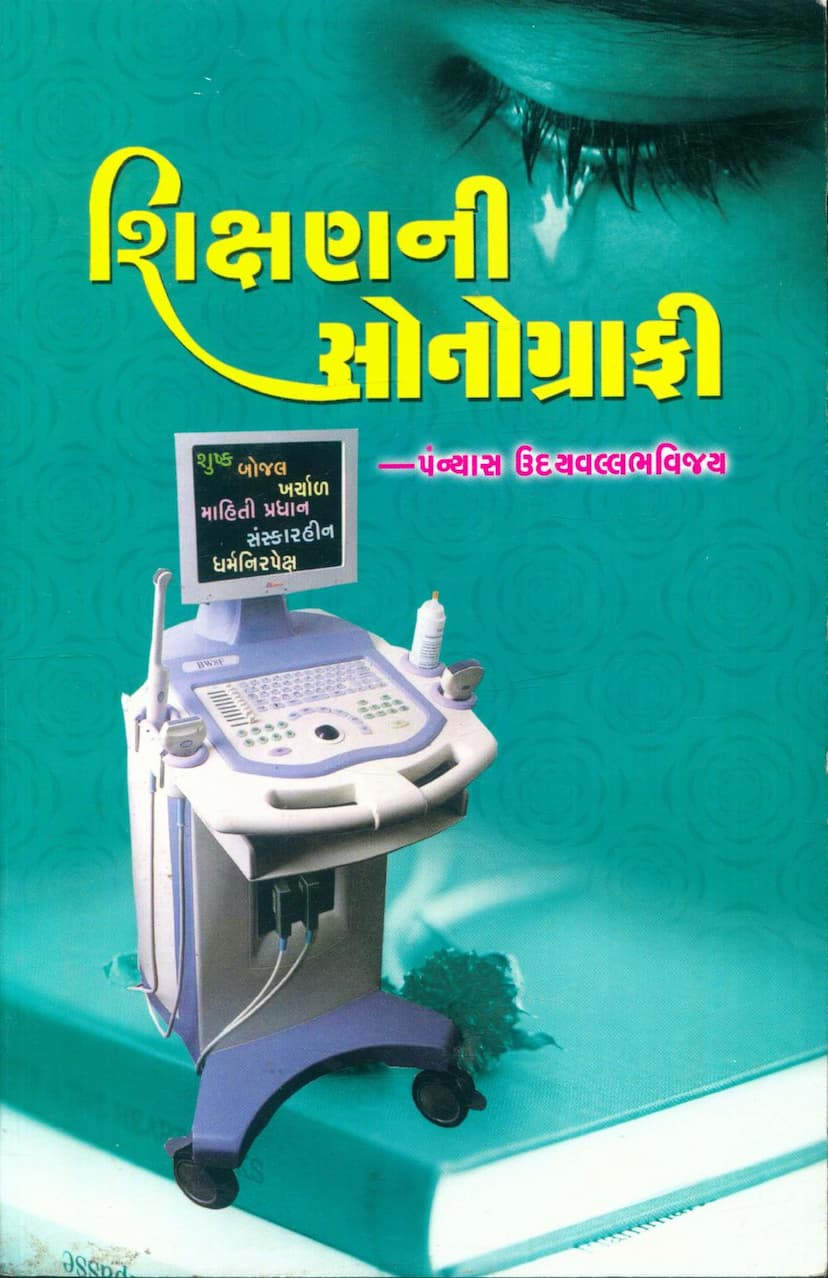Shikshanni Sonography
Added to library: September 2, 2025

Summary
Here's a comprehensive summary of the Jain text "Shikshanni Sonography" (Sonography of Education) by Muni Udayvallabhvijay, based on the provided pages:
Overall Theme:
The book offers a critical examination of modern education, labeling it as "Shikshanni Sonography" (Sonography of Education). It argues that while modern education excels at imparting information and knowledge, it fundamentally fails in cultivating character, values, and a holistic understanding of life. The author uses the analogy of a sonogram to diagnose the ailments of the current educational system, highlighting its shortcomings and suggesting a need for a profound transformation.
Key Criticisms of Modern Education:
- Lack of Heart in Education: The core criticism is that modern education focuses on the intellect ("brain blossoms") but neglects the heart ("heart withers"). It fails to teach compassion, love, empathy, friendship, peace, and forgiveness, which are essential for a meaningful life.
- Information Overload vs. True Knowledge: The book distinguishes between information (data) and knowledge (applied wisdom). Students are seen as "drinking milk of information" but not converting it into "blood of knowledge" that impacts their character and actions.
- English Medium's Detrimental Impact: The author strongly critiques the dominance of English as the medium of instruction. It argues that it disconnects students from their mother tongue, culture, and family elders, leading to cultural conversion and a sense of alienation. It also debunks the myth that English proficiency is a prerequisite for development.
- "Boojhal" (Burdensome) and "Kharchal" (Expensive) Education: The curriculum is overloaded, schedules are tight, and examinations create immense pressure. This makes education a stressful, "prison-like" experience for students, rather than an enjoyable journey of learning. The cost of education is also highlighted as a significant burden.
- Emphasis on Examination Rather Than Learning: Education has become "examination-oriented" rather than "learning-oriented." The purpose of education is seen as passing exams and getting degrees, not genuine understanding or character development. This leads to rote learning, competition, and psychological issues like inferiority or superiority complexes.
- Commercialization of Education: Educational institutions are criticized for prioritizing profit over true education. Admissions are influenced by donations, teachers seek financial benefits, and the teacher-student relationship has become transactional (customer-vendor) rather than one of respect and mentorship.
- Erosion of Values and Ethics: The book laments the decline of values like honesty, integrity, and discipline. Corruption is rampant in admissions, examinations, and even teacher recruitment. This commercialized and unethical system produces graduates who may be knowledgeable but lack moral compass.
- Neglect of Mother Tongue and Cultural Roots: The dominance of English and the neglect of mother tongue education leads to a loss of cultural identity and a disconnect from traditional values and family heritage.
- Unrealistic and Irrelevant Curriculum: The curriculum often focuses on irrelevant subjects (e.g., foreign history/geography) while neglecting vital aspects of life, such as personal values, ethical conduct, and spiritual development. The book criticizes the imitation of Western educational models without considering Indian cultural context.
- Decline in Teacher-Student Relationship: The sacred teacher-student relationship has deteriorated. Teachers are often disrespected, and the focus has shifted from "teaching" to merely "managing" students. The author contrasts this with the ideal of teachers as mentors and guides, citing historical examples.
- The Problem of "Amrutam" (Nectar) vs. "Vish" (Poison): The book questions whether the current education system produces "nectar" (wise, virtuous individuals) or "poison" (materialistic, unethical individuals). It highlights how certain educational practices, like studying the life cycle of a plant by dissecting it, can inadvertently instill cruelty.
- The Impact of Technology: While technology offers advancements, its over-reliance can stunt critical thinking and creativity, turning the brain into a mere "information warehouse" or "computer."
- The Missing "Heartbeat of Religion": The book, deeply rooted in Jain philosophy, criticizes the secular nature of modern education, which omits any mention of spirituality, karma, dharma, or the pursuit of liberation. This, it argues, creates a void in the student's understanding of life's ultimate purpose.
Author's Perspective and Proposed Solutions:
- Call for Educational Revolution: The author calls for an "educational revolution" and a "sonography" to diagnose and treat the ills of the current system.
- Emphasis on "Education of Heart": True education should focus on cultivating compassion, love, and character alongside intellectual development.
- Revival of Traditional Values: The book subtly advocates for a return to the values of ancient Indian education systems (like Gurukuls), which emphasized character building, respect for teachers, and holistic development.
- Importance of Mother Tongue: The author strongly advocates for education in the mother tongue, seeing it as the conduit for culture, values, and identity.
- Need for Value-Based Education: Values should be integrated into every subject, not treated as a separate, optional topic. The impact of learning should be in shaping behavior and character.
- The Role of Parents: Parents are highlighted as the primary "guardians" and educators, and their role in instilling values at home is crucial. They need to be active participants in their child's moral and spiritual development.
- Teachers as Role Models: The author emphasizes the need for teachers to be role models, not just information providers, and to embody the values they preach.
- Critique of the "Examination System": The entire examination system is questioned for its excessive focus on marks and its contribution to stress and unethical practices.
Overall Message:
"Shikshanni Sonography" is a powerful critique of modern education's shortcomings, urging a return to values-centric, holistic learning that nurtures both the intellect and the heart. It argues that a society's future depends on the quality of its education, and a system devoid of ethics, spirituality, and character development is ultimately detrimental. The book serves as a wake-up call for educators, parents, and policymakers to re-evaluate and reform the educational landscape.